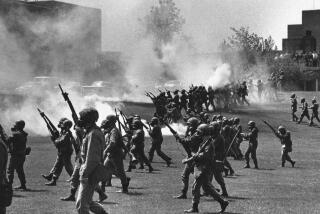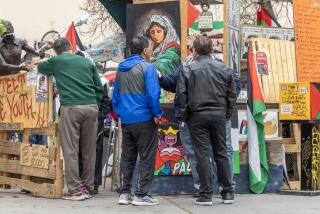The Shattered Dream: CHINA /1989 : CHAPTER 5 : Gorbachev--A Strange Hero in a Strange Land
- Share via
BEIJING — “The events have not run their course--far from it.” --Mikhail S. Gorbachev, at the end of his first day in China
The impending arrival of Soviet President Mikhail S. Gorbachev for the first Sino-Soviet summit meeting in 30 years added a new element to the demonstrations in Beijing. Gorbachev represented youth, openness, flexibility, political change--things the Chinese students yearned for, things their own leaders seemed to them incapable of delivering.
Gorbachev’s visit also meant new visibility for the protesters. With the Soviet leader came more reporters and more television crews. Many stayed after Gorbachev left China, and many more arrived as the protests escalated. Hordes of journalists were on hand to record the climactic events of subsequent weeks.
On Saturday, May 13, two days before Gorbachev’s scheduled arrival, about 1,000 protesters began a hunger strike in Tian An Men Square. Unless their demands were met, they vowed, they would remain in the square and embarrass China and its aged leaders before the world.
The hunger strike was unprecedented in China, a nation that has known centuries of deprivation and starvation. That students would risk illness or death to dramatize their cry for freedom caused immense impact as the news spread through and beyond the capital.
With the hunger strike under way, the Sino-Soviet summit presented the Chinese government with a daunting challenge. How could the authorities recapture the streets--and the world stage--from the masses of peaceful demonstrators?
Even General Secretary Zhao Ziyang, who would become the protesters’ leading ally, issued a dramatic televised appeal to the students Saturday evening to call off their protests and avoid humiliating their country during the summit.
“The whole world is watching,” Zhao said. “I think every citizen who loves his country will think carefully. We must protect our international reputation and not do anything that would damage the summit meeting.”
Zhao’s message had no noticeable effect. On May 14, red banners representing Beijing universities dotted Tian An Men Square. A large black banner proclaimed, “Hunger strike!”
“The Soviet Union has Gorbachev. Who does China have?” read a banner in the square. “You’re 58 and I’m 85!” read another, comparing Deng Xiaoping, who will be 85 in August, to Gorbachev.
By nightfall, 50,000 students and factory and office workers had gathered in the square, nervously expecting to be cleared out for Gorbachev’s arrival the next morning.
“The government won’t let the world see so many students demonstrating here,” one student predicted that evening. “I think maybe the police will move in.”
But the police held back. Tens of thousands of students and supporters remained in the square beyond the 8:30 a.m. Monday deadline set by authorities to clear the site.
The fast-swelling crowd forced authorities to move the May 15 welcoming ceremony from Tian An Men Square to Beijing airport. The Chinese honor guard and military band were bused to the airport from their barracks near the Great Hall of the People. Apologetic explanations were offered to the Soviet advance team.
“We recognize that it would be physically impossible to carry out this part of the program,” Gennady I. Gerasimov, the chief Soviet spokesman, said when the ceremony was relocated. “Why should we worry? They are friendly crowds. But this is a matter for the Chinese.”
Aboard Gorbachev’s jet, an official of the Soviet Foreign Ministry told him that perhaps half a million Chinese had congregated in and around Tian An Men Square.
“How big is this square?” asked an incredulous Gorbachev. “Perhaps half a million people? Is that possible?”
Assured that it was, Gorbachev asked about the nature and temper of the crowd and the possibility of violence.
“We saw no threat,” the official said later. “On the contrary, according to the people we had in the square, the crowd was overwhelmingly friendly toward the Soviet Union and toward Mikhail Gorbachev personally. In a way, it was a welcome beyond our imagination. Who would have thought that after all that passed between us, the leader of the Soviet Union would be welcomed as a hero in China?”
On Monday evening, after he had seen the crowds for himself, Gorbachev summoned his China experts--diplomats, intelligence officers, journalists--for a two-hour discussion at his guest house after the welcoming banquet at the Great Hall of the People.
He peppered them with questions about the protests until past midnight, seeking to understand what the outcome might be, what the underlying issues were, how the leadership was handling the situation, what the long-term impact would be. He challenged those offering timid assessments to rethink their positions. He also cautioned the others, a considerable number, who were carried away by the enthusiasm of the students.
“This is not our country, not our struggle,” Gorbachev said toward the end of the evening, according to a senior journalist who was present. “Stand back, study. . . . The events have not run their course--far from it.”
Gorbachev was correct. His tour of the Forbidden City was canceled because of the crowds in Tian An Men Square and along Changan Avenue, the main east-west boulevard in Beijing. Plans for him to lay a wreath at the Monument to the People’s Heroes in the center of the square were scrapped.
Even his press conference was transferred, just as it was due to begin, from the Great Hall to the Diaoyutai guest house, where the Soviet party was lodged. And his half-planned, half-spontaneous walkabouts were dropped except for one brief stop--out of fear, as a Soviet bodyguard put it, that “if he gets out of the car, we may not be able to get him back into it safely.”
Gorbachev and his Chinese hosts got down to business on the morning of May 16 at their first working session. The Soviet leader got on well enough with Deng and Li Peng. But he found a kindred soul in the reformer Zhao.
“These two were on the same wavelength within minutes, and by the end of the evening, it was as if they had known one another for years,” a Soviet official said later. “Gorbachev would start a thought and Zhao would finish it, and vice versa. . . . Their talk was broad and often philosophical in nature, and it was really meaty.”
The Soviet leader, sympathizing with the predicament posed by the turbulence, told Zhao: “We also have our hotheads who want to renovate socialism overnight. But this does not happen in real life, only in fairy tales.”
The Soviets did not realize then how deep were the divisions within the Chinese leadership. Nor were they aware of early moves to bring reluctant military units to Beijing to crush the demonstrations.
Outside the Great Hall, 150,000 students, supporters and curious residents congregated. The banners took on a personal tone: “Deng Xiaoping--when people get past 80, they get muddled!”
Frequent sirens punctured the generally festive atmosphere as ambulances arrived to treat or take away student hunger strikers, dozens of whom had begun to faint as their fast entered its fourth day.
As night fell, the crowd held at 100,000. The government pleaded with them to disperse. But it did not use force.
“The success of the summit meeting is in the interest of both the Chinese and the Soviet people and conducive to peace and stability of the world,” said an official statement issued that night. “As the hunger strike has been going on for several days, and it is cool at night, some students have fallen ill.
“Leaders of the party Central Committee and the State Council are deeply concerned about this, and they hope the students will return to their campuses as soon as possible. What is most needed now is calmness, reason, restraint and order.”
May 17 brought the biggest protests yet, perhaps 1 million people in and around Tian An Men Square. A new demand was formalized: the resignations of China’s senior leaders.
“We demand that Deng Xiaoping, Li Peng, old people and those among the young who are incapable should immediately resign,” a student leader declared over a loudspeaker in the square.
The people of Beijing, protected by their numbers and the apparent unwillingness of the government to launch a crackdown, enjoyed a rare opportunity to ridicule their leaders in public.
“Clean up the high-level garbage!” read one banner. “Stupid old people should resign quickly!” read another.
The official news agency reported that students and workers held large protests in 24 provincial cities.
China’s leaders were losing their grip, and they knew it.
To the world diplomatic community, it was a stunning spectacle. World leaders were largely silent, unsure what to make of the protests that were diverting attention from the Deng-Gorbachev summit.
“If there were no economic problems and no student demonstrations, it would be a great moment for Deng,” said an Asian diplomat in Beijing. “It’s a great tragedy indeed that he can’t savor this moment as he should.”
While Gorbachev visited Shanghai on May 18, another enormous crowd gathered in and near rain-drenched Tian An Men Square.
Open-backed trucks drove through Beijing, horns blaring, carrying workers with banners that criticized Deng and proclaimed support for the 2,000 or so hunger strikers still in the square. More than 1,000 hunger strikers had been taken away for treatment, medical workers said, but some returned after partially recovering.
In an apparent gesture of conciliation, Li Peng agreed to a televised meeting with a dozen student leaders that evening. As a consequence, China’s citizens were treated to an unprecedented public humiliation of one of their leaders.
Li was immediately berated by 21-year-old Wuer Kaixi for being late. Another activist, Wang Dan, called on the premier to address the students’ demands or accept responsibility for further unrest.
Li replied sharply: “In the last few days, Beijing has fallen into a kind of anarchy. The government of the People’s Republic of China is responsible for the whole nation. We have the duty to safeguard the students’ lives, factories, the fruits of socialism and our capital.”
And in a transparent threat to use force to quell the protests, Li concluded: “The situation will not develop as you wish and expect, even though you have patriotic zeal. . . . I do not intend to blame the students for all the turmoil. But I hope you will think over what the final consequences might be should the situation worsen.”
More to Read
Sign up for Essential California
The most important California stories and recommendations in your inbox every morning.
You may occasionally receive promotional content from the Los Angeles Times.













